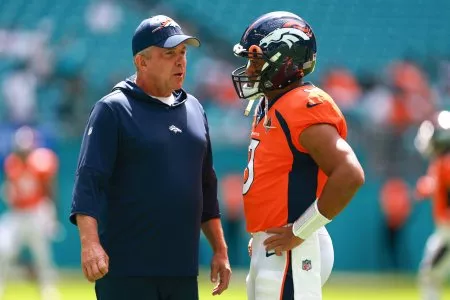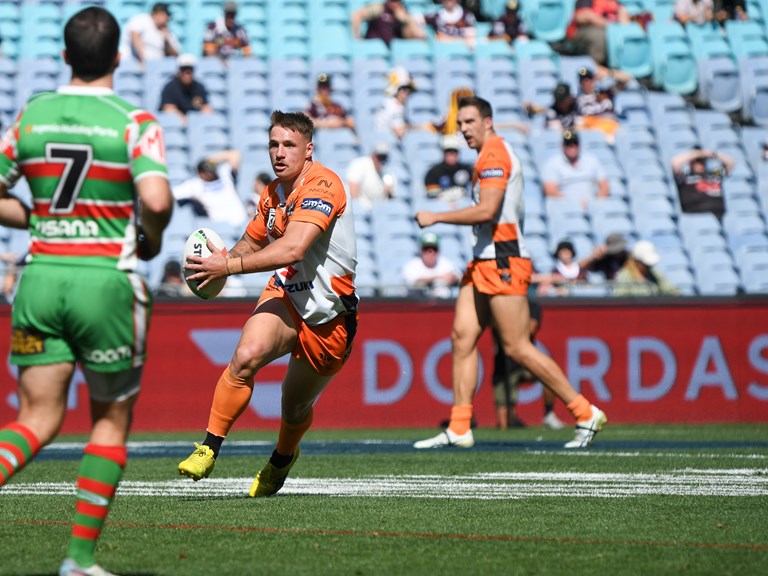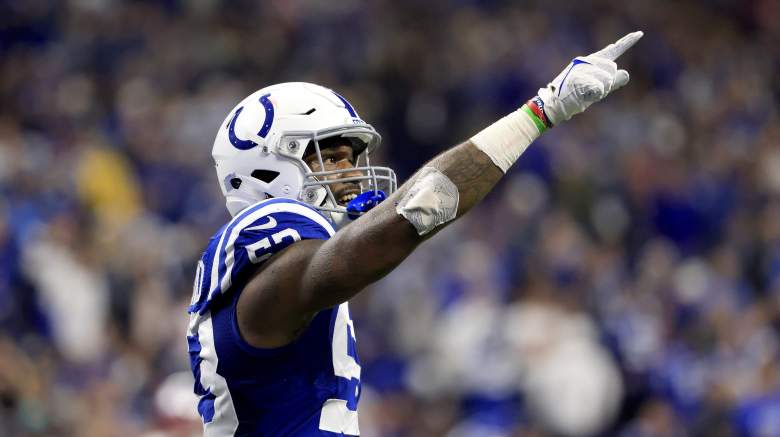Depending on who you ask, the Denver Broncos are approaching the next NFL trade deadline in different ways.
ESPN’s Adam Schefter reported that the AFC West club is receiving offers, but will see how the next few weeks go before deciding if it’s time to sell.
However, coach Sean Payton took a slightly different stance on Tuesday.
“We have no intention of doing business with any of our players,” Payton said, according to an article on NFL.com. “That doesn’t stop teams from making calls from time to time. We’re just going to answer the phone, but that’s pretty much where we are.

Since a sale essentially means forfeiting the current season, it’s understandable why Denver isn’t publicly stating its collective stance.
At the same time, however, the discussion about the upcoming trade deadline ignores a major challenge: the Broncos appear hamstrung by Russell Wilson’s contract.
Let’s break it down.
Denver Broncos head coach Sean Payton talks with Russell Wilson before a game against the Miami Dolphins on September 24. The quarterback’s contract includes a significant amount of guaranteed money.
“The $124 million guaranteed by Wilson weighs heavily”
When the Broncos acquired Wilson, it felt like a statement of intent.
The AFC’s best teams all have stars under their belt. In theory, Denver could fight fire with fire.
Of course, it didn’t happen that way. In 20 games in Colorado, Wilson has lost 75 percent of them.
He threw for 4,734 yards and 27 touchdowns during that span, and the signal-caller failed to bring his club any closer to the division crown.
And while that’s already hard to swallow, his contractual situation only makes things worse. Wilson signed a five-year contract extension with the Broncos, earning a whopping $124 million in guaranteed money.
This amount also makes moving the quarterback extremely difficult as teams continue to rely on money.
Let’s say Denver decides it’s time to really shake things up and shake up the roster.
If that’s the case, Wilson and his sizable salary — his cap hit was about $35 million in 2024 and won’t dip below $50 million after the 2025 season — could be seen as more of a hindrance than a help.
If she doesn’t perform like a star, paying her is simply absorbing resources that could be spent on young talent.
If so, you would want to trade or cut the quarterback, right? Well, that’s where things get complicated.
to know more
At this point, a trade seems hard to imagine: Wilson hasn’t performed at his best, and one would assume that other NFL teams would be reluctant to pay his full salary.
And to make things even more difficult, the Broncos would still be stuck, at least partially, holding the bag.
According to Over the Cap’s contract calculator, a trade before June 1 would net the club $68 million against the 2024 salary cap.
A trade after June 1 would make things sweeter, but Denver would still have $18.4 million in dead money.
A later move is also less desirable, as most teams want to have a franchise quarterback earlier in the offseason.
And remember, a trade requires another team willing to take over the contract.
It’s entirely possible that Denver will have to withhold some of his salary or give something in return to the other general manager.
And these compromises, while perhaps necessary, are not the ideal way to orchestrate a recovery.
But how about removing Wilson? This would have been unthinkable before and would involve a major change.
But what does this mean financially? Once again, releasing the QB before June 1 would be a major blow, leaving the Broncos with $85 million in dead cap space in 2024.
The most palatable option would be a cut after June 1, as it would burden Denver of debts. just $35 million in dead cap through the 2024 campaign.
This amount is not ideal, but it is relatively manageable.
However, it’s worth noting that these moves would help the Broncos’ situation through 2025.
Barring the highly unlikely trade after June 1, Denver will pay its quarterback at least $35 million next season. Wilson’s contract means Denver has to work smart
When you combine his poor performance with his big contract, it’s unlikely the Broncos will move on from Wilson in the near future. However, this reality is expected to continue to influence the club’s spending habits.
As the Over the Cap founder’s chart shows, this makes improvements – even if they are long-term fundamental measures rather than short-term acquisitions – difficult.
And assuming Wilson isn’t going anywhere, something else has to give. Consider the two names Schefter mentioned in his report: Courtland Sutton and Jerry Jeudy.
In 2024, the former receiver carries the Broncos’ second-highest cap hit behind Wilson ($17.35 million).
Relative to the cap, Jeudy’s share comes to just under $13 million.
Even if you can’t escape the entire cap hit, any extra wiggle room is helpful.
Would such measures immediately change the situation for the Broncos? Of course not, but it is necessary to free up some wiggle room when acquiring assets, likely in the form of draft picks, if you are both struggling on the field and faced with a situation difficult financial situation.
So, as the NFL trade deadline approaches, it’s easy to focus on players who could move. In the Broncos’ case, however, a huge (probably) immovable contract must dictate how they move forward.



